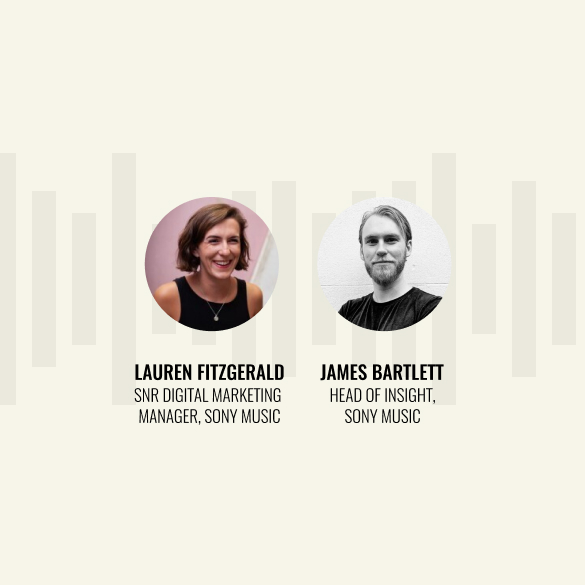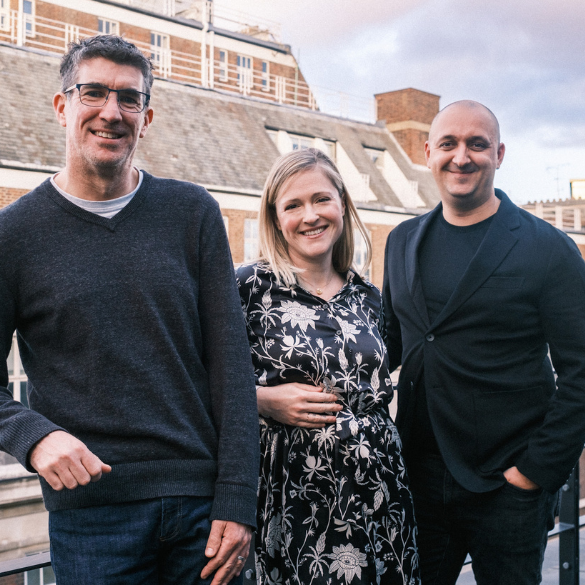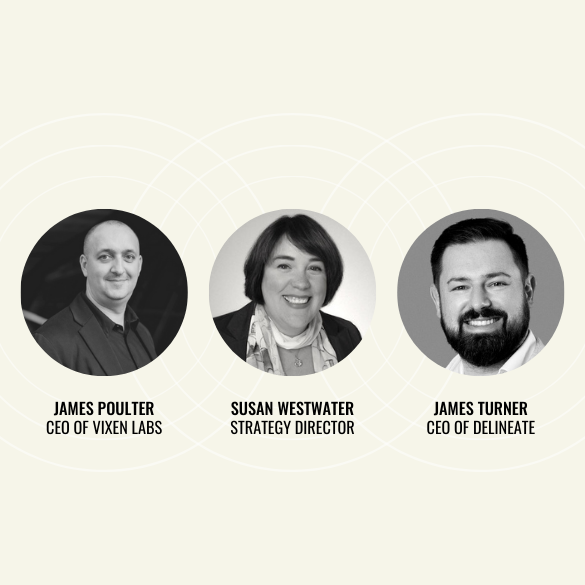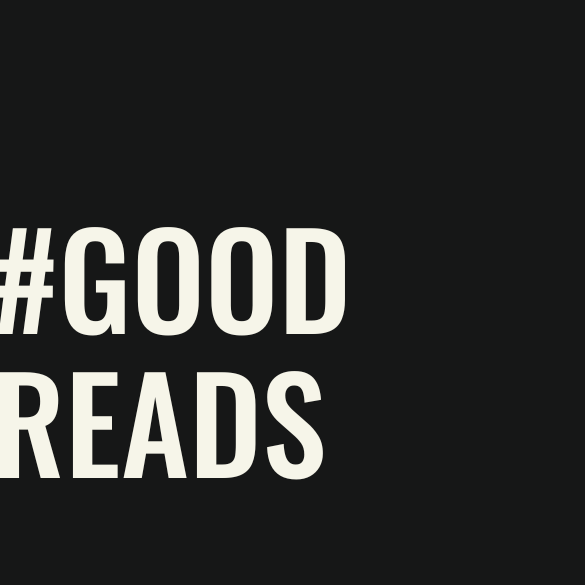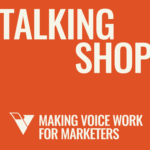
Listen to Talking Shop Episode 4
Listen to Episode 4 of Talking Shop: Making Voice Work for Marketers right here. Talking Shop is a brand new podcast series from Vixen Labs, taking you through the core findings and insights from the Voice Consumer Index 2021.
In episode 4, we go back to where it all started: entertainment. Nowadays, skills like Hand Wash Tunes are connecting fans with artists in innovative ways, while a good voice strategy can increase artist visibility and facilitate information about albums, live events, and ticket purchasing. We’re chatting about this with James Bartlett and Lauren Fitzgerald of Sony Music UK.
Or read the transcript
James Poulter 00:00
Entertainment. It’s one of the original voice use cases. We buy smart speakers, headphones, and cars, hopefully, with a decent stereo system, because, first and foremost, we want to listen to great music, podcasts, radio, audiobooks, and learn about all of those things, too. The music industry has been transformed by the streaming era. And now voice is set to evolve that transformation even further, as we begin to discover and engage with artists, not just by browsing for them on our streaming sites on our mobiles.
James Poulter 00:30
But by asking for them with our voices, voice users across the globe are turning to their smart speakers to find new music, reconnect with their long-held favourites, and increasingly, find new ways to connect with those artists and acts directly.
James Poulter 00:44
Today, we’re joined by people who should know more about this transformation firsthand than most: James Bartlett and Lauren Fitzgerald, from Sony Music UK, longtime friends and clients here at Vixen Labs, and also experts in their own right on the world of voice and music from some of the projects that they’ve worked on over the past few years. And we’re gonna get into all of that in just a moment. But first of all, welcome both of you to the show. Lauren, why don’t you just introduce us to yourself?
Lauren Fitzgerald 01:08
I’m Lauren Fitzgerald, I am a Senior Digital Marketing Manager at RCA, part of Sony Music. That means I look at digital strategy and audience development for the artists on the RCA roster.
James Poulter 01:23
And, in particular, we’ve been working together over the past year or so on a project that’s pretty close to your heart as well. Why don’t you just tell us a quick one about what that is?
Lauren Fitzgerald 01:31
Yeah, sure. So we worked with the team of Vixen to develop the Paloma Faith skill, Paloma’s Bedtime, which was a skill designed where users could listen to Paloma read bedtime stories, sing lullabies, and listen to different sleep sounds. It’s been a really fun project to work on.
James Poulter 01:50
It has, indeed, we’re gonna get into that a bit more in a moment. And we’re also joined by James Bartlett, also from the Sony team. James, do you want to just introduce yourself?
James Bartlett 01:58
Hey, James, of course, yes, I’m James Bartlett, Head of Insight within 4th Floor Creative, which is Sony Music UK’s creative and strategic intelligence hub. Ultimately, within the insight team, we’re responsible for primary consumer research across a broad array of topics. But of course, voice has been, you know, quite paramount to a lot of our research over the last couple of years.
James Poulter 02:20
Absolutely. And it’s something that we’re thinking even more about at the moment in the life cycle of that consumer, which has changed quite drastically. And I think that’s what we want to kind of start with to look at as we gather to really think about where voice is having an impact in the same industry. As I said in the intro, you know, streaming obviously, for the past decade has completely transformed the entire business model of the music industry.
James Poulter 02:43
And now we’re seeing that it’s become such a dominant way in which people engage with their music, but the devices that they’ve been streaming that on have obviously changed in recent years and smart speakers here in the UK, in particular, have had a major impact on the way in which that factors. We saw in our own research that, you know, smart speakers are becoming one of the most dominant ways that people listen to music, certainly in the home, and that people are using their voices as well, wherever they are.
James Poulter 03:07
In fact, 67% of voice users deigned playing a song from their favourite artist as their top entertainment ask and probably not a big surprise to any of us, we buy these devices to listen to music. But obviously this is having a big impact on the way in which music is consumed. And, ultimately, that means the way in which we kind of change how we market to consumers as well. So, Lauren, maybe just from a kind of festival…from that kind of label perspective, you know, RCA, one of the biggest labels in the UK and one of the big ones within Sony in particular: how do Sony and RCA approach the change in music consumption that’s been brought about by the rise of voice assisted devices, how’s it impacting the way in which you let people know what there is out there to listen to?
Lauren Fitzgerald 03:48
It’s been a really interesting shift. Because I think, on the one hand, the job of, like, a marketing team within the label has remained the same; our job is to find fans and inform them about the artists and inform them that music is available to them and create that kind of world around a release. But also, I guess, we’re competing with this new medium, we still have to market like awareness of a track, and a lot of that is happening off of a voice device.
Lauren Fitzgerald 04:21
So all of the usual places are staying really important. But instead of, I guess, marketing like a click onto something when marketing awareness of an artist name and the name of a track…count the phrase that people need to say to find that song. So we’ve kind of approached it in a couple of ways I think. I’ll say we work primarily with what we call frontline artists, which is developing artists or currently releasing music. As Sony, I guess we’ve looked at a lot of catalogue stuff and optimising catalogue to work for voice devices. But on a frontline kind of label side, we’re looking at how we can work with artists to involve them in that user journey.
James Poulter 05:04
Yeah, because I suppose when people don’t know the name of someone that’s come up with a song. Maybe they’ve heard that track in a clip on Love Island, or they’ve heard a clip here, they’re kind of in an advert or something like that, knowing who to ask for is a problem. And then particularly if you’re doing that, in a world where there isn’t a visual input, people need to know the names of tracks and artists again, which maybe wasn’t always the case, perhaps recently.
Lauren Fitzgerald 05:26
Yeah, and I think it’s exactly that. And I think that’s where, like, I guess the challenge is still the same: marketing the song and getting that message across in order to, like, build familiarity for people to then, like, opt in to want to listen something…is still exactly the challenge, just the way that they’re opting in has changed. We’ve seen a shift, I guess, in, like, people becoming more familiar with track names, with a rising streaming. But I think, if you put a playlist on your speaker, if you ask some, if you ask for, like, happy songs, and a playlist comes up, and you’re just cooking, and music’s playing on background, and then you might like a song, but you do have no way of if you don’t have a screen, you have no way of knowing what that song is, unless you Shazam it or something…so we have to find a way to force a behaviour to have people build that affiliation between the song and our artists, who were ultimately trying to build a brand for and build that positive relationship with the tracks.
Lauren Fitzgerald 06:31
So we’re doing a lot of work with artists to make sure that they are communicating to their fans how they can engage with their music through voice speakers. But I think we’re also doing a lot of work alongside that to just think about that user journey, and how we can make it easier for people to go from hearing a song to loving an artist.
James Poulter 06:56
I suppose, because it happens in that kind of passive, inactive way, right? So, like, you mentioned that you’ve stuck a playlist on that might be quite generic in its name, like ‘Happy Songs, or what? I think, like, at the weekend, we had ‘Italian Classics to Cook To, because my eldest daughter wanted a kind of Italian themed night…we were making pizzas.
James Poulter 07:11
So yeah, there’s that kind of very passive way of like, just…music is playing. And I might turn and ask Alexa what’s playing, or I might say, to my assistant, you know, kind of tell me what this is. Maybe if I’ve got a screen device in front of me, it might be telling me anyway, but you mentioned there, it’s also about encouraging artists to change the way in which they’re talking about their songs, how does that materially show up in campaigns now that you’re working with, with artists that are kind of on the label. Like, what stuff are they actually having to do to make that awareness kind of begin?
Lauren Fitzgerald 07:40
It sounds really, like, rudimentary, but it is literally just videos of them doing what we’re going to ask fans to do. That’s the kind of most basic version, I guess. And we work a lot with artists who have fan bases that are very engaged with their favourite artists’ social media. So, if we post a video, then they see it, it’s kind of the most, like, immediate way we can, we can kind of get that across.
Lauren Fitzgerald 08:07
But then we’re also looking at partnering with platforms to do stuff that’s just a little bit more interesting or a bit more custom. So if you ask us a certain song, can we have a piece of content that you’re rewarded with that you wouldn’t get if you hadn’t done something that’s exclusive to people that activated the song from, like, voice devices?
James Poulter 08:28
Or like you said, that’s kind of giving back that…that adds extra to kind of help build that audience and kind of make it more custom of an experience. To James, I want to…I tend to be asked this question about, yeah, we know that people love to ask more than just for the music. They also love to ask questions of their voice assistants about all sorts of things related to entertainment.
James Poulter 08:47
Yeah, we saw in our recent report that 57% of voice users in the UK said they’re finding the answers to common entertainment related questions, something that they were actually really very likely to do. And that means that people are trying to discover not just the music, but things about the music or about artists. Where’s that beginning to impact the way in which artists are thinking about their content? Or how they connect with people? Yeah, they try to answer these questions, as well as also just tell people where the track is.
James Bartlett 09:15
I mean, absolutely, I think probably Lauren may even be better place than me to talk about how content around artists has evolved based on the kind of requests people might be kind of, you know, having their devices and the questions they might be asking about artists. But I think, you know, one of the things that we’ve noticed outside of sort of typical music requests, if you like, is that these devices definitely lock into certain routines and offer real utility value to people and families that are using them.
“SO, BEYOND JUST LOOKING AT MUSIC AND OTHER THINGS, PEOPLE MIGHT WANT TO FIND OUT ABOUT AN ARTIST.”
James Bartlett 09:48
We’ve also seen kind of a number of opportunities where our artists can fit into context and perhaps even engage with users where their music, and perhaps them as an artist, may previously not necessarily have fit in as easily. So I think a really great example of that is something like Paloma’s Bedtime, but other initiatives like Hand Wash Tunes, which was a skill that was created within 4th Floor Creative, I think are really good examples of music and artists, perhaps fitting in around other contexts.
James Bartlett 10:18
And just to sort of expand a bit on Hand Wash Tunes. It was, ultimately, the very start of the pandemic, obviously, there’s a lot of public information around hand washing at a time, and advising people to hand wash for 20 seconds to prevent the spread of COVID. But I think, intuitively, we also kind of saw that messaging but knew that may be easier said than done for some families, you know, mandating that as parents might cause tantrums on a regular basis, or might face some resistance for younger members of the household.
James Bartlett 10:47
And ultimately, that led us to a concept of a 20-second musical timer that can be activated by voice. So really easy to do when your hands are wet with a custom audio from our artists, that ultimately helps make hand washing far more fun for the whole family. I think that’s a really nice example of where music and artists can suddenly slot into a moment where perhaps previously it might have been very cumbersome. And perhaps previously, they wouldn’t necessarily have asked that of our artists or our music. But really, there’s a real value-add we can have by kind of creating those kinds of initiatives.
James Poulter 11:20
Yeah, I think when we were building out all of the content that went into that, you saw the kind of artists that kind of lined up, and suddenly you’ve got these different artists every single day that are being kind of featured in it. And there are people that you wouldn’t necessarily always expect and they’re kind of popping in, but then they suddenly have relevance by being a part of that very daily habit you mentioned, you know, like hand washing our hands or with the case of Paloma, things like, you know, kind of the bedtime stories or sleep sounds and focus.
James Poulter 11:46
Yeah, we’ve seen this across the industry, haven’t we…kind of smart speakers, they are very much things that fit into our daily habits, routines, lives, that they’re things that we use for repeat tasks. And yeah, it’s the same way we use music, we use music in our daily lives…whether it’s motivation for running, or helping us go to sleep, or yeah, kind of keeping us accountable to doing something fun, like those songs that are in the skill, but yeah, kind of hopefully, also doing something helpful…washing hands.
James Poulter 12:10
So yeah, people are changing their habits there. I think that’s super interesting. You mentioned they’re also about the content side of things. So, maybe, Lauren, just to kind of bring you in on this one as well: are artists thinking about different types of content that they have to put out there because they know that people are asking voice devices and voice search to get the answers?
Lauren Fitzgerald 12:30
I think we are thinking about it on behalf of artists a fair amount, I think the type of content that people are asking for has stayed pretty much the same. Over time, when you have a favourite artist, you have a favourite song, you want to know where you can watch the music video, what the video is about, like, who wrote the song with him? What is the song about? All of those contextual pieces of information around the art.
Lauren Fitzgerald 12:55
But then there’s also the practical side of it, of ‘where can I get tickets?’, ‘where can I buy merch’, ‘where can I see or have access to this artist?’ And, pre-voice-speakers, I guess we saw all of that traffic going to websites. So we’ve now very much thinking about how we can pivot. So we’re covering all of that off on the voice side of things as well, and make sure that we have the answers for those questions, for the fans and make that a satisfying interaction. So you’re not sent through like a bunch of different results to try and get the information that you want. So we’re working with artists to make sure that the website is completely up to date, or that we have, like, FAQ sections and that kind of stuff, and really listening to what people want and trying to make sure that we can cater for that in the relevant places.
James Poulter 13:47
Yeah, and I suppose we see this coupled with this rise in voice search more generally, right? The research shows not just within entertainment, but across the board, that people are using their devices more and more to ask the simple questions. Now most of what we’ve looked at so far has been more kind of in that context of smart speakers in the home, obviously, some of the projects we’ve worked on. But what we really see when you look across different ages and demographics is some quite different types of usage by device and also by the assistant that they want to use.
James Poulter 14:17
James, perhaps, maybe, you can kind of give us some insight on this. Yeah, we know that younger voice users, they’re experts in using their smartphones. And as a result, they’re experts in using their voice on their smartphones. We saw from the research that they’re most likely for those in that kind of 18 to 24 year old demographic, the youngest that we’ve surveyed, you know, Apple and Siri is their device of choice, obviously predominant, the iPhone being their device of choice. So how do you think that that’s going to have a bearing on your kind of music discovery when it comes to kind of younger generations? Do you see anything significantly different in terms of the way that young people discover music versus those that are maybe up in age, and what impact voice might have there?
James Bartlett 14:57
I think in terms of brand new discovery, so someone literally stumbling upon some music or an artist that they’ve literally never heard before. I think perhaps…
“…THAT YOUNGER GENERATION USING VOICE MEANS THAT THEY’RE MORE PRONE TO BE SURFACING ARTISTS BY MOOD OR CONTEXT-CENTRIC RECOMMENDATIONS…”
…or even a mix of both than they had been previously, because as we spoke about earlier, in order to request a specific artist you kind of have to know that artist’s name. So in terms of discovering something new that you haven’t heard of, it may well be coming from those kinds of context and mood style recommendations.
James Bartlett 15:35
You know, we know it’s relatively natural via voice perhaps to even ask things that you wouldn’t ask other text-based input, so, you know, you mentioned earlier, James, things like ‘play me Italian music to cook to’ or something like, you know, ‘Upbeat Songs to Dance To’ or ‘Sad Songs that Are Popular on TikTok. These are all requests that you may well not type in, but are quite intuitive to ask when you’re using a service like Siri.
James Bartlett 16:00
And, obviously, there’s quite a few interlocking layers, those requests, you know, there’s contexts, cues in there, there’s mood-based cues in there. So, as Lauren mentioned earlier, we really have to kind of optimise and position catalogue and new releases accordingly to ensure that, ultimately, our artists’ music has the opportunity to surface in those kind of instances when, you know, people can be given some quite specific requests that could surface music they hadn’t heard before. And, as you said, maybe even some quiet sort of esoteric style requests, these devices that ultimately our music could fulfil for them.
James Poulter 16:33
Lauren, for you, when you’re thinking about some of those frontline artists, often appealing to, you know, kind of those young demographics…does that really change the way in which you’re thinking about partners, and also like, where you place music, and how and then how people actually go and access those, because that must factor into some of those decisions.
Lauren Fitzgerald 16:51
When it comes to frontline artists and the kind of new artists that were developing and trying to build those kinds of, like, early stage fan bases for, I think, having to think about the context in which people are going to find that music is really important. And we, as an industry, I think, have very much traditionally marketed based on genre, and subcultures. And if you had a punk band, you made sure you’re in all the punk playlists, right? But I think now we’re seeing that shift that James is speaking about to people using music to soundtrack feeling or time of day. And that is, it’s more of a challenge to create that association to an artist and to get that goodwill transfer from the feeling you’re getting over to the exact person that’s providing that feeling.
Lauren Fitzgerald 17:45
So that’s where I think all of the other assets that we create around the song become so important. I mean, we still continue to make a lot of music videos. And that’s because the music video conveys the mood of the song, or the content that we create online conveys the kind of feeling that we’re trying to create around stuff. So all of those additional assets are still so important to help us position a song in a place where you end up on the ‘Happy Songs’ playlist, or the ‘Italian Songs to Cook To’ playlist. It’s, like, that’s how we create that picture for our partners and for fans to place that song or that artist in that area of what they’re going to use the music for.
James Poulter 18:31
You’re so right, because it means that we’re beginning to ask for things prompted by the emotions or the activities rather than what we traditionally think of our…our interests. As in, I like jazz, you know, it’s like, well, that’s not true. I don’t like all of jazz, I like certain things of jazz that mostly…I like bits of jazz, because of the way it makes me feel, or because it accompanies something that I’m doing. Like, there’s probably a lot of like, you know, EDM that I don’t really like, but I only like when I’m running or I’m only like when I’m exercising, and it totally changes that dynamic.
James Poulter 19:00
And I think the playlist thing is super interesting, because yeah, we’ve seen that that’s a way that people are discovering entirely new areas of music, and you know that they’re discovering them outside of the context of knowing an artist, or knowing an album or even liking that genre. As you say, they’re just discovering them because it was on a playlist somewhere. I mean, James, tell me, how important are these playlists now, in terms of the way in which people are getting discovered or building audience? Is it more important that people know the track? Or is it more important for people to know in what playlists that person might show up?
James Bartlett 19:34
I think, realistically, it’s ultimately always going to be a combination of both. I mean, obviously, playlists are very important and kind of getting that, you know, an artist positioned on a playlist, so that we are there perhaps for some of these requests that people can be making these devices.
James Bartlett 19:51
But as we spoke about earlier, we also want to be making sure that someone can then jump straight back into that artist and their music at another point in the future. And so we kind of want to be making sure that we’re also marketing around who that artist is, the name of the song, so that when it comes to that next request, it’s not about remembering exactly what you asked for when you’re in that particular mood in context, next time you’re able to go straight to that artist, and then music, if you so desire.
James Poulter 20:20
Yeah, I think that context switching is going to become more frequent for everybody. It’s, you know, sometimes you’re going to know an album and an artist’s name, sometimes it’s…I only know them in the context that I heard them on this playlist. And that dynamic makes things really interesting. So, as we come in to land here, I want to just ask you a couple of things about kind of where you see all of this going, you know, we’re looking at a little bit in the crystal ball, but maybe some predictions are always worthwhile having.
James Poulter 20:45
Yeah, the data shows from the research that people are searching for things like event information. And, in some cases, they’re even purchasing tickets with voice assisted devices, merchandise, and obviously, physical sales, as, certainly, things like vinyl haven’t gone away in their entirety, far from it. So when you think about kind of what further opportunities there might be for Sony, and the artists and the label and the other parts of the business in genres, things like kids or, you know, kind of older adults or re-engaging with the catalogue, where do you see voice beginning to factor into reaching new music fans in the future? And particularly also building these audiences? What are you excited about?
Lauren Fitzgerald 21:22
I think the utility side of stuff that you kind of spoke through the purchasing the information, like, I think that will always be there. But I think we are in a creative industry, we work with creative people. So I think the exciting element for me is how artists are going to use a new medium to create their art, and create the world around that art. I think we haven’t really ever had a world where we just put songs out, they’ve always made sure that they styled themselves and made videos and had live shows and dance routines, and all of that stuff that creates this feeling or this kind of that builds on the art in some way.
Lauren Fitzgerald 22:08
And, I think, we are now at the stage where…
“…ARTISTS ARE STARTING TO SEE THE OPPORTUNITY WITH VOICE SPEAKERS AS A PLATFORM IN WHICH THEY CAN BUILD ON THEIR ART FORM.”
And that’s, I think, where I’m most excited to see where it goes. As soon as you put this technology in the hands of people that are always iterating and always getting more creative, how can they, like, push the boundaries of it? And how can we work with them to do that? And then on a more business side, I guess, like we’re in an attention economy, how can we build interesting things for our artists that build their brand, outside of just people listening to their music? And, I think, you know, we’ve spoken about it already, but the Paloma skill was like a version of that. For me, it was like you love Paloma Faith’s music, here’s a way that you can have Paloma be part of a completely different area of your life. And that extension of artists’ brand in the space, I think it’s gonna be really interesting.
James Poulter 23:07
Yeah, super fascinating. I think you’re absolutely right, that we haven’t even begun to scratch the surface on the way in which some of these creative kind of some of the most creative individuals we have on the planet will probably understand that as things kind of get more easy for them to access. And also as they begin to see it show up in the marketing of their own art, right, the more that we’re all saying, Alexa, open this or Google Assistant open this, the more that they’re gonna resonate with the fact that there might be something here to do to kind of capture that attention. So absolutely. What…James, same question to you: kind of where do you see this curve going? You know, are we all going to be buying our tickets from Alexa in the next few years? Or is it still some way off?
James Bartlett 23:45
I certainly think these devices will become much more conversational, I suppose over time.
“SO I THINK IT’S GOING TO BE VERY NATURAL IF YOU’RE LISTENING TO MUSIC THAT YOU LIKE TO CONTINUE THAT JOURNEY WITH THE DEVICES AND ASK THEM MORE ABOUT AN ARTIST, THE MUSIC…”
…you know, where that’s…where are they playing live next? ‘Are they coming to my city?’ Or perhaps if it’s a, you know, a screen enabled device…’Can you show me cool merch by this artist?’
James Bartlett 24:10
I think those slightly more conversational interactions will become a really, really big part of how people are engaging with voice. I think going forward, often these devices can fulfil really kind of specific requests for people. And they’re kind of getting used to actually how can I go a bit further than that? I think as the…as the technology evolves, and as we’re structuring for that, I think people will get used to really sort of engage in conversations rather than just one-off requests with the devices. And I think that’s what we can really look forward to. And that’s going to open lots of doors.
James Poulter 24:40
And hopefully we end up meeting in the middle between your guys’ two predictions right, you know, consumers get more advanced in what they’re asking, more willing to chat, talk to these things for longer. And then artists meet them with really engaging experiences that kind of go that one step further as well. So it sounds like the future for the kind of musical voice interface is alive. Well, and that’s got some exciting stuff ahead of us. Well, if this is something that you guys want to listening you’re interested in and some of the projects that the guys have mentioned, you’ll be able to find the links to all of the skills we mentioned, things like ‘Hand Wash Tunes’, Paloma Faith’s bedtime story, you can obviously go and ask your smart speaker of choice for those things, depending on where you’re listening to, but you’ll find links to those in the show notes as well.
James Poulter 25:19
But for now, James, Lauren, I’m saying thank you so much for spending some time with us to chat about the recent research and the data. And we’ll be back next week with another deep dive into the world of voice for brands and marketers for now. Thanks so much for being here. We’ll see you again soon.

